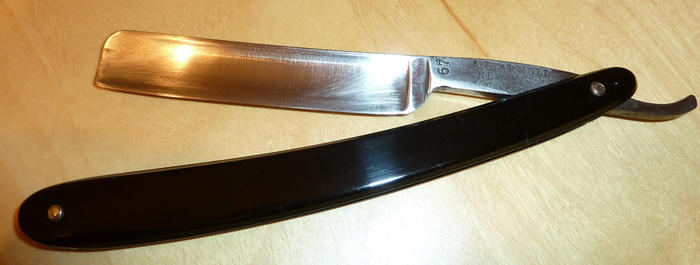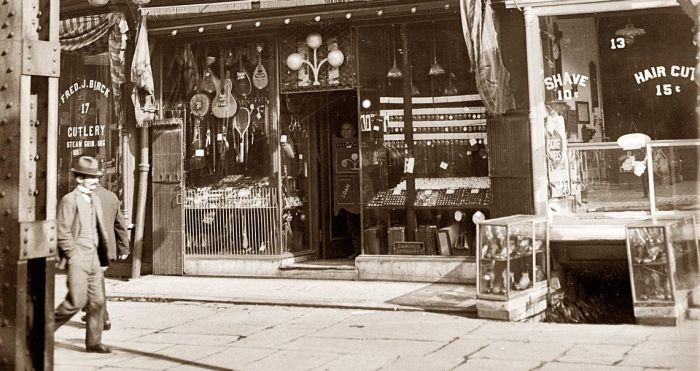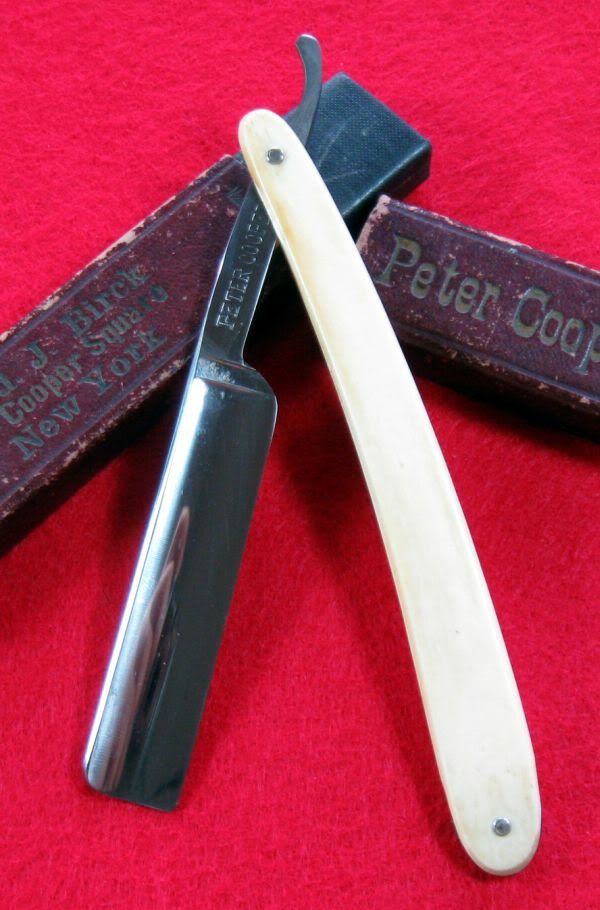Results 1 to 9 of 9
-
10-23-2011, 08:08 PM #1Junior Member

- Join Date
- Oct 2011
- Location
- Eatontown, NJ
- Posts
- 21
Thanked: 0 Help with what to do with this...
Help with what to do with this...
This is my first antique store razor purchase. Cost me a few dollars as I got it with two Gillette Old Type Ball razors and a Mohawk brush for $18.
The scales cleaned up real well with my Novus plastic polish, but the blade has been stubborn and aside from different grades of sandpaper, I don't really have much else other than a dremel.
I'm on the fence as to just get it honed as is and use it as-is or try and clean up the rust on the blade and make it beautiful.
I haven't been able to find any pertinent information on this razor, where exactly it is from or if it's anything of real rarity or reverence. The only markings on the blade is a "67" and "A.B. Arnold Made In Germany".


Any advice on what to do if you were me would be appreciated. Mind you, I do have a shave ready cos-flaw razor inbound from WhippedDog and a nice Russian razor, shave-ready from a B&B member that I picked up for $25.
So, unless this blade is something special, I really don't want to invest much more than $30 into it, including honing (which I can't really afford the equipment to buy right now).
-
10-25-2011, 01:01 AM #2Member

- Join Date
- Jun 2011
- Posts
- 39
Thanked: 10
Hone it and use it...looks like a beauty, what's there to restore?

-
10-25-2011, 01:19 AM #3Junior Member

- Join Date
- Oct 2011
- Location
- Eatontown, NJ
- Posts
- 21
Thanked: 0
anyone know anything about this make?
ah, the camera hid some of the rust spots and the other side has some spots too. I suppose I can work on sanding it every night or so until it gleams and then send it off to get honed since I don't have the gear for it.
As it sits, it's actually quite prettier than the one I received from Larry :P
-
10-25-2011, 03:57 AM #4Member

- Join Date
- Jun 2011
- Posts
- 39
Thanked: 10
When you get down to it, as long as you get all the loose rust off, the only part that counts is the edge. The process of honing will get the edge highly polished, so you're all set. Several of my favorite shavers are covered in patina (ahem "black rust")...kinda fun letting the age show through. It earned it

Happy shaving!
-
10-25-2011, 12:06 PM #5Junior Member

- Join Date
- Oct 2011
- Location
- Eatontown, NJ
- Posts
- 21
Thanked: 0
I started working the blade last night with 320-400-600 grit sand papers. I'm gonna try and bring up a higher luster working through hand sanding since I think this blade has the potential to shine up really nice. I go over the scales again and then I'll get it honed.
I'll take pics after it's all finished.
-
10-25-2011, 01:03 PM #6

A. B. Arnold was a retailer in New York who ordered razors with his company's name stamped on the tangs for resale. There is no way to know what German company produced razors for him or if he dealt with several German razor makers. Chances are it is a decent razor that will give you good service. But, the only way to really know is to put it to the test and judge for yourself.
Regards - Walt
-
10-25-2011, 01:08 PM #7Junior Member

- Join Date
- Oct 2011
- Location
- Eatontown, NJ
- Posts
- 21
Thanked: 0
Walt,
Thanks for that info. That's kinda what I started to presume. Any idea what kinda time frame we're looking at or even any addresses for Arnold in New York?
-
10-25-2011, 01:30 PM #8

I suspect A.B. Arnold may have been a storefront operation somewhere in the early to mid-1900s. It was probably similar to the Frederick J. Birck store shown here on Cooper Square in 1920. I have an F. J. Birck razor and it's kind of cool to see where it was originally sold from. Sorry I can't give you more precise information. If it's important to you, you could contact the New York City Library and they could do a search of city directories from that time and provide you with an address and some dates.
Regards - Walt


-
10-25-2011, 10:24 PM #9Junior Member

- Join Date
- Oct 2011
- Location
- Eatontown, NJ
- Posts
- 21
Thanked: 0
I unpinned this tonight and found some rather interesting numbers on the inside of the scales as I was polishing them. On the inside of each scale are listed, "8/5 37" ... any ideas as to what this indicates? maybe 5/8 blade, year 1937? I think they are Bakelite scales.


 LinkBack URL
LinkBack URL About LinkBacks
About LinkBacks






 Reply With Quote
Reply With Quote
